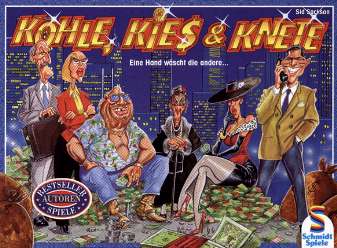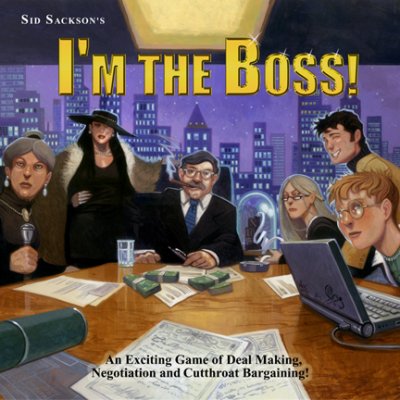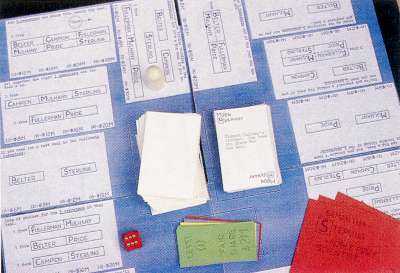
 KOHLE, KIE$ & KNETE
KOHLE, KIE$ & KNETE(aka I'M THE BOSS!)

 KOHLE, KIE$ & KNETE
KOHLE, KIE$ & KNETE
(aka I'M THE BOSS!)
While there is much to admire in most of Sackson's games, I don't think that any of them is as much plain old fun to play as KOHLE, KIE$ & KNETE. (Pronounced, apparently, COAL-a, KEES, und k-NAY-ta.) The three words in the title are all slang terms referring to money, and the title has been translated as "BUCKS, BOOTY & BREAD." Pretty unwieldy, if you ask me. Apparently, Sackson's original title for the card game that it started out as, was "It's A Deal!," which is a little better but not much. (See below right for a picture of the "It's A Deal" prototype!) My nomination for a title for this game would be "I'm The Boss," but under any name, the game is a corker.
The game is now available in a wonderful English edition (with translations into many other languages) from the splendid people at Face2Face Games under the name I suggested here of "I'M THE BOSS." I have a few minor quibbles about this edition, but they're so minor as to not be worth mentioning here, and this game is so much fun, it's well worth snatching up while you can. Besides, the original German version will set you back at least $100 if you can even find it.
(If you understand German, there's a lot more information about the transformation from "It's A Deal" to "Kohle, Kie$ & Knete," at this link.)
 It's a game of dealmaking and negotiation. The six unsavory characters pictured on the box are six investors. The board consists of 16 deals arranged in a circle. These deals require anywhere from 2 to 5 investors to
consummate. In some cases, specific investors are required, and in others, you just need 2 from a list of 3 plus 2 from a list of the other three, or any five, etc. Each deal is worth shares
equaling one more than the number of investors (so, a deal requiring 4 investors is worth 5 shares, etc.) The value of the shares increases as the game proceeds, so the first few deals are only worth $2 Million per share, and the ones at the end of the game are worth $5 Million per share.
It's a game of dealmaking and negotiation. The six unsavory characters pictured on the box are six investors. The board consists of 16 deals arranged in a circle. These deals require anywhere from 2 to 5 investors to
consummate. In some cases, specific investors are required, and in others, you just need 2 from a list of 3 plus 2 from a list of the other three, or any five, etc. Each deal is worth shares
equaling one more than the number of investors (so, a deal requiring 4 investors is worth 5 shares, etc.) The value of the shares increases as the game proceeds, so the first few deals are only worth $2 Million per share, and the ones at the end of the game are worth $5 Million per share.
Each player starts out with one investor card, representing one of the six. The remainder (when fewer than six are playing) are temporarily set aside. All that's needed to conclude a deal is the agreement of the players holding the investor cards on how the shares are to be split up. This isn't as simple as it sounds, because there's a deck of cards in the game. Each player starts with five cards, and can hold as many as 12. These cards are immensely valuable, but you can only get additional cards by passing up a potentially lucrative opportunity to make a deal. (Fiendish, that Sid Sackson!) Where it gets interesting is in the fact that each investor has four relatives, and these relatives can fill in for the investor in completing a deal. However, although you keep your investor card when using it in a deal, you discard the relative cards when they're used, so it's more of a sacrifice. Someone may be just about ready to conclude a deal, and you can throw your relative card on the table and say that you'll take $1M less.
 There are all sorts of other wonderful mechanisms in the game, such as cards that let you take over a deal before it's concluded ("I'm the boss now!"), cards that let you steal investors from other players, cards that let you temporarily send an investor (or a relative) on a vacation ("Well, you need Talerfeld to make that deal, and I sent him on vacation, and I've got the only Talerfeld relative left, so you've got to deal with me now, and I won't take less than $8 Million to seal the deal.")
There are all sorts of other wonderful mechanisms in the game, such as cards that let you take over a deal before it's concluded ("I'm the boss now!"), cards that let you steal investors from other players, cards that let you temporarily send an investor (or a relative) on a vacation ("Well, you need Talerfeld to make that deal, and I sent him on vacation, and I've got the only Talerfeld relative left, so you've got to deal with me now, and I won't take less than $8 Million to seal the deal.")
One particularly brilliant device is in the way the game ends. The player who successfully concludes the 10th deal must roll a die. If he rolls a 1, the game is over and the player with the most money wins. If he rolls any other number, the game continues. The player who concludes the 11th deal rolls, and if it's a 1 or a 2, the game ends, and so on. Since the deals at the end of the game are the biggest, this makes for a lot of suspense.
Unless you can keep running totals as to how much money each player has (and if you can, I don't want to play with you!), you don't know who's winning until everyone counts their money at the end of the game. It's not wise to enter into deals with the player in the lead, so there's a lot of play-acting going on in which the leader pretends to be not as well off as he really is. This, of course, just adds to the fun.
It's really an enormous amount of fun. There's lots of talk around the table, from temporary alliances to cutthroat bargaining. The game was only published in Germany, by Schmidt Spiele in 1994, and is already out of print. It is becoming more and more popular and sought after, and so is fairly expensive when you can find a copy. If you ask my advice, I say pay whatever you have to to get it. There is an excellent translation of the rules available online, and you don't need to speak German to play the game.
Click to see if Funagain Games has I'M THE BOSS or KOHLE, KIE$ & KNETE.